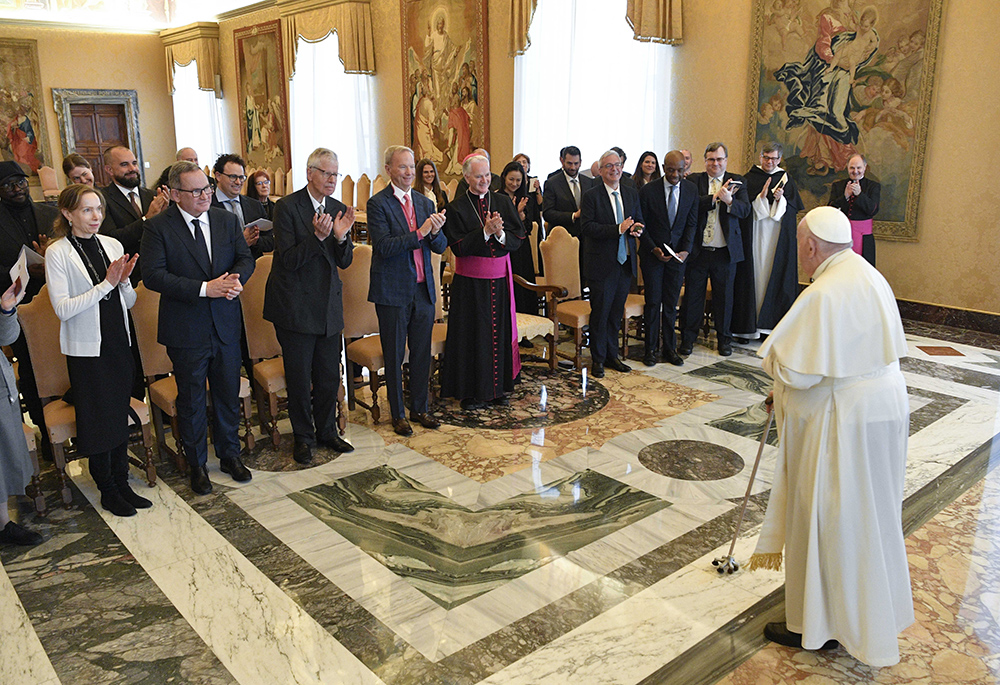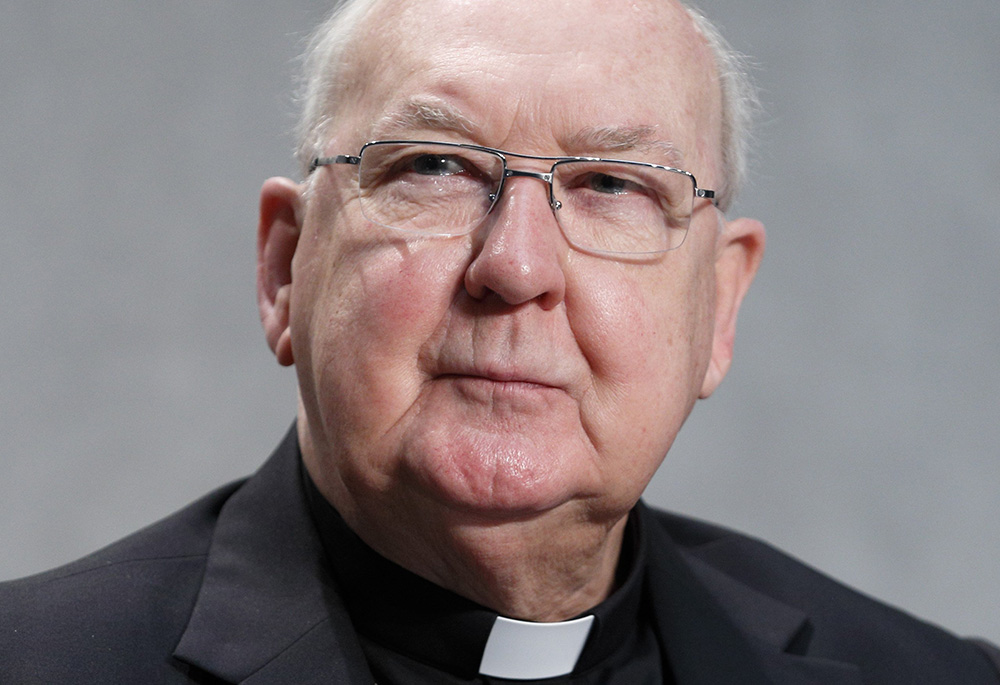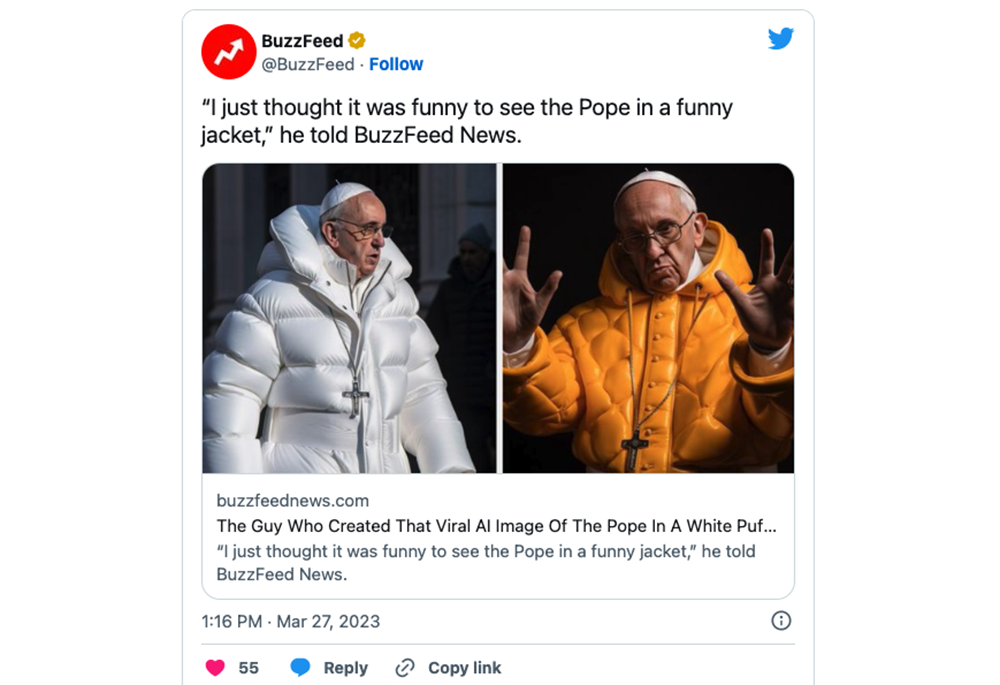
Pope Francis meets leaders from the tech industry March 27 at the Vatican. He called for an "ethical and responsible" development of artificial intelligence. Over the previous weekend, an image of Francis sporting a white puffer jacket went viral online; but the image was fake, generated by a man who used AI to produce it. (CNS/Vatican Media)
An early spring has arrived in the Eternal City, where gorgeous days of sunshine are abruptly interrupted by hailstorms and rain showers. A similar whiplash has been felt around the Vatican in recent days where a prominent American cardinal rose in the defense of Pope Francis after a series of attacks on the pope's alleged management style and another well-known American bishop was spotted in St. Peter's Square filming a video with a noted papal critic.
To borrow from Lord Byron: "Oh, Rome!"
In the morning hours of Monday, March 27, after a stormy sunrise, Bishop Robert Barron of Winona-Rochester, Minnesota, was spotted in St. Peter's Square filming a conversation with Canadian psychologist and conservative commentator Jordan Peterson.
.@BishopBarron and @jordanbpeterson filming in a rainy St. Peter's Square for @realDailyWire this morning. pic.twitter.com/5YyR2KkCXx
— Catholic News Service Rome (@CatholicNewsSvc) March 27, 2023
The scene quickly became the subject of feverish chatter, both here in Rome and online, given that only a few weeks earlier, Peterson had taken aim at Francis on social media, saying, "There is nothing Christian about social justice."
Peterson followed up: "I don't give a damn if the Pope himself thinks it's a good idea. It's evil."
Barron's appreciation for Peterson is no secret. Back in 2019, he caused quite a stir at a U.S. bishops' meeting when he cited the commentator as an example of how to engage young people on social media. Since then, the two men have twice held friendly recorded discussions, with Word on Fire — Barron's multimedia ministry — noting that "collectively, the two talks have attracted one million views and 12,000 comments."
Whether or not the two men, as they made their way through St. Peter's Square on Monday, discussed Peterson's recent pointed criticism of Barron's boss, Pope Francis, remains to be seen.

Cardinal Kevin Farrell, prefect of the Dicastery for Laity, the Family and Life, attends a news conference at the Vatican in this May 10, 2022, file photo. (CNS/Paul Haring)
Meanwhile, American Cardinal Kevin Farrell, who heads the Vatican's office for marriage and family life, took to the pope's defense in a new essay published on March 28 in America magazine.
In it, the cardinal reflected on his seven years serving in the Roman Curia and pushed back against appraisals of Francis as an autocrat who governs the Vatican through fear.
"These critics attempt to contrast the public image of Pope Francis as an apostle of God’s mercy with a contrived image of an internal autocratic style that allows no dissent," wrote Farrell. "Unnamed Vatican officials supposedly fear to speak their true minds and lack trust in each other, with the result that the current condition of the church is not honestly discussed at the highest levels of church governance. Do such pundits really believe Pope Francis is capable of such hypocrisy?"
Farrell doesn't name names, but it's easy to read between the lines.
Advertisement
Ross Douthat, in his New York Times column, marked the 10-year anniversary of Francis' election earlier this month by lamenting the "tribulation" of this papacy and a "decade of bitter internal arguments and widening theological divisions." In First Things, columnist George Weigel labeled it a "somber" anniversary, writing that "the prevailing mood in today's Vatican is one of trepidation" and that "papal autocracy has created a miasma of fear."
Weigel's syndicated column was published in the "The Boston Pilot" and the "Catholic Weekly" in Sydney, Australia, prompting an uproar online, given that Boston's Cardinal Sean O'Malley is one of the members of Francis' nine-member body of cardinals who regularly meet with the pope to advise him, and Sydney's Archbishop Anthony Fisher is on the Vatican's synod council.
Sources close to O'Malley say that when he was informed his diocesan newspaper had published the Weigel essay, he immediately had it removed online.
One person likely unfazed by the din reverberating around St. Peter's Square is the pope himself, who unwittingly caused another form of commotion this week in the online public square of social media.

A BuzzFeed tweet shows fake imagery of Pope Francis sporting a white puffer jacket. (NCR screenshot/Twitter)
Over the weekend, an image of Pope Francis sporting a white puffer jacket went viral online, garnering the attention and commentary of celebrities and millions of viewers. The image, however, was a fake, generated by a 31-year old in Chicago who admitted he was simply tripping on mushrooms when he thought it would be amusing to use artificial intelligence to produce the image.
When asked about it, he said the immediate popularity of the fake image taught him a lesson: “It’s definitely going to get serious if they don't start implementing laws to regulate it," he said of artificial intelligence's power and perils.
By happenstance, on March 27, Francis met with a delegation of scientists and tech industry professionals at the Vatican where he praised the potential of artificial intelligence if used for the common good, but warned that it must be used in an "ethical and responsible way."
The pope might also say the same about social media personalities, podcasters, newspaper columnists and certain Catholic bishops.








